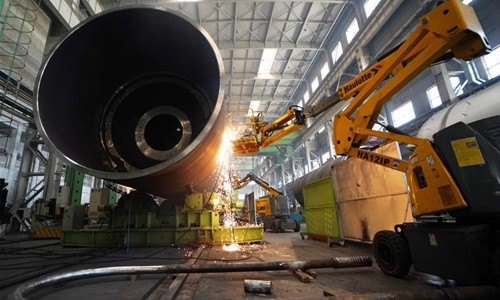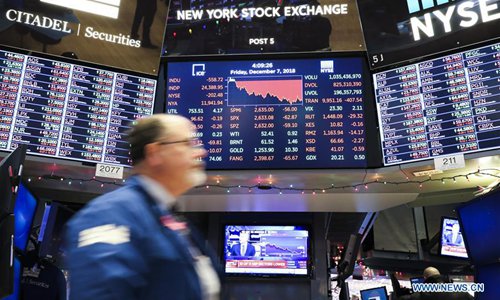Dire fears for world economy
Uncontained virus may drag global growth to recession levels: analysts

People work in a workshop of Harbin Boiler Company Limited in Harbin, northeast China's Heilongjiang Province, Feb. 10, 2020. Chinese authorities are carefully balancing efforts to control the novel coronavirus epidemic and minimize its impact on the economy as millions of people head back to work Monday after an extended holiday. Photo: Xinhua
Global equity investors have effectively launched one of the clearest distressing signals so far for the world economy, as they staged one of the worst stock market routs this week that wiped more than $1.7 trillion off in market value on a single day, pointing to deepening fear of potentially grave impacts of the coronavirus epidemic on the global economy, as the deadly virus continues to spread through major economies in Asia and Europe.The widespread stock sell-off, which started in the US, was in direct response to spiking confirmed infections in several countries such as Japan, South Korea and Italy over the weekend that, coupled with the US' costly trade wars, could further cripple the global supply chain and bring growth to near recession levels, analysts said on Tuesday.
Such a severe risk calls for more coordinated global efforts to both contain the epidemic and minimize its economic impact rather than more barriers for travel and trade, and China, which has already seen the resumption of production two weeks ago, could play a major role, analysts noted.
Distressing signals
The global stock selloff kicked off Wall Street on Monday, when the Dow Jones Industrial Average index plunged 3.56 percent, or over 1,031 points - the third-worst daily point drop in its 124-year history. The rout also spread through Europe on Monday and the Asia-Pacific region on Tuesday. In total, global markets lost $1.73 trillion on Monday alone and $2.44 trillion since February 19, CNBC reported on Monday.
"The sharp decline in global markets were responding to signs that the epidemic has not been controlled overseas," Dong Dengxin, director of the Finance and Securities Institute at the Wuhan University of Science and Technology, told the Global Times on Tuesday, adding that global investors have already been skittish due to rising risks for both the stock markets and the economy.
While the epidemic showed abating signs in China excluding the epicenter Hubei, Italy, Japan, South Korea and Iran have reported sudden increases in confirmed cases in recent days. In total, there were more than 2,000 cases in 29 countries and regions outside of China, where the number reached over 77,262, according to latest data from the World Health Organization (WHO) on Monday. The WHO has warned of a global pandemic but maintained it was too early to declare one.
Still, the fear of the pandemic and its economic cost is deepening worldwide. Many analyses have painted a dark picture for the world economy. In the worst case scenario, a pandemic could lead to a decline between 20 percent to 40 percent in stock markets and an 11 percent plunge in global GDP, according to a model pandemic exercise conducted by the Johns Hopkins Center for Health Security in October 2019.
Another insight by global consultancy Oxford Economics last week predicted that a pandemic could cost the global economy $1.1 trillion and push the US and the Eurozone into recession.
"In the short term, the epidemic could cause more serious impacts on the global economy than the US-initiated trade war with China," Sang Baichuan, director of the Institute of International Business at the University of International Business and Economics in Beijing, told the Global Times on Tuesday, noting that the epidemic has caused more sudden disruptions to the global supply chain and will affect more countries and regions than the China-US trade war.
If the epidemic situation continues to worsen, few economies would be spared of the potential damage, and major economies such as China, Japan, the US and Europe will take the hardest hit given their closely intertwined supply chain, according to analysts. "So far, the Chinese, Japanese, South Korean and the Italian economies are suffering, but in time, no one will be safe alone," Dong said.
In terms of industries, the epidemic's impact goes far beyond the manufacturing sector. Many other sectors from financial markets to energy to global tourism could not escape the outbreak, Wang Xin, president of the Charigo Center for International Economic Cooperation, told the Global Times on Tuesday.

Electronic screen shows the closing numbers of stock market at the New York Stock Exchange in New York, the United States, Dec. 7, 2018. U.S. stocks closed sharply lower on Friday as investors digested a batch of economic data. The Dow Jones Industrial Average fell 558.72 points, or 2.24 percent, to 24,388.95. The S&P 500 fell 62.87 points, or 2.33 percent, to 2,633.08. The Nasdaq Composite Index fell 219.01 points, or 3.05 percent, to 6,969.25. Photo: Xinhua
Call for action
Such dire risks for the world economy and the inter-dependence among different economies further underlined the need for closer global collaboration both to contain the epidemic and to revive global economies, analysts said.
"There is no exaggeration here when we say if we don't work together, everyone will suffer," Sang said, "but instead of collaboration, some countries are trying to split the world economy and raise more barriers for trade rather than take them down."
Despite repeated recommendations from the WHO, many countries have moved to impose restrictions on travel and trade in an attempt to contain the epidemic. As of Thursday, 141 countries and regions have put in place entry restrictions and 13 have imposed other restrictions on certain imports from China, the China Chamber of International Commerce said on Tuesday.
Apart from the WHO, many organizations have also urged against limiting travel and trade while calling for collaboration. The Johns Hopkins Center for Health Security, after the pandemic model exercise, also called for coordinated efforts to maintain travel and trade "even in the face of a pandemic."
As the world's second-largest economy and the biggest contributor to global growth, China is essential to the efforts in stabilizing the world economy and other countries should cooperate with China over their responses to the epidemic and economic measures, analysts said.
"China has already taken robust measures to resume production and revive the economy. Other countries should help in this process rather than dampening it because that's not in anybody's interests," Dong said.